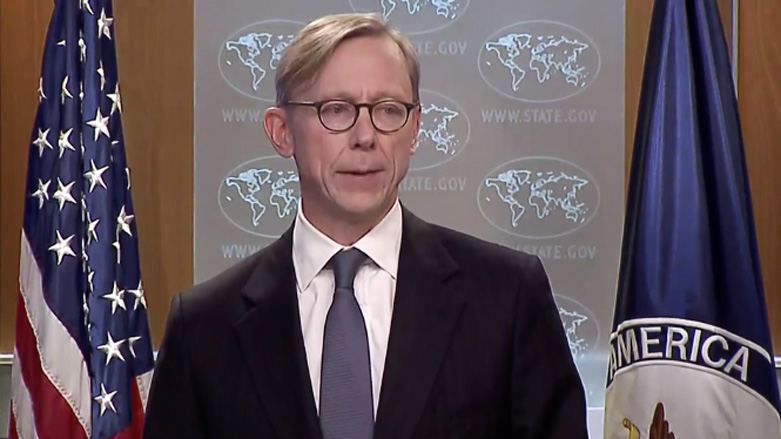US sanctions IRGC commander for human rights violations, as it reaffirms maximum pressure campaign

WASHINGTON DC (Kurdistan 24) – The US on Friday designated Brig. Gen. Hassan Shahvarpour of Iran’s Islamic Revolutionary Guard Corps (IRGC) for major human rights violations in the suppression of protests.
The new measure was announced by Brian Hook, US Special Representative for Iran and Senior Policy Advisor to the Secretary of State, in a briefing to journalists.
The new sanction prevents Shahvarpour and his immediate family from traveling to the US and is, thus, mostly symbolic. However, it is the second time in as many months that the Trump administration has penalized Iranian officials for human rights abuses and is meant to signal a US focus on the issue.
Read More: US announces measures against Iranian leadership for human rights violations
Iranian Protests and their Repression
Shahvarpour “oversaw the massacre of 148 helpless Iranians in the Mahshahr region,” Hook said, explaining that the IRGC officer had been “in command of units responsible” for the regime’s “violent crackdown and lethal repression” of demonstrators. Mahshahr lies in the southwestern province of Khuzestan, and the majority of the population in the province is Arab.
Protestors “gained control of most” of the city of Mahshahr and its suburbs, The New York Times reported then, “blocking the main road to the city” and an “adjacent industrial petrochemical complex.”
The response of the Iranian regime was so lethal and indiscriminate that Mahshahr’s representative in the Iranian parliament protested publicly and vehemently, while parliament was in session. His words were, thus, broadcast on Iranian state television, as he likened Iran’s revolutionary regime to the monarchical regime, which it had overthrown some forty years before.
“What have you done that the undignified Shah did not do?” he protested, as other parliamentarians stepped in to stop him from speaking further.
Iran had been gripped by nation-wide protests—the largest since the 1979 revolution—after a Nov. 15 hike in gasoline prices. However, the US assassination of the IRGC’s Quds Force commander, Gen. Qassim Soleimani, on Jan. 3, appeared to create a backlash, generating a sense of national unity. But that soon dissolved, after the regime was obliged to acknowledge that it had accidentally shot down a Ukrainian airliner after three days in which it had denied responsibility for the doomed plane.
Almost all of the 176 people on board the flight were Iranians, dual citizens, or of Iranian origin, and Iranians soon became angry at what they saw as the regime’s mendacity and incompetence.
An Iranian television presenter, for example, said in an Instagram post, addressed to the Iranian public, “Forgive me for 13 years of lying to you on Iran television.”
Iran’s Economic and Political Troubles
Hook also affirmed that the Iranian regime “is in deep economic crisis.” Current US sanctions “are the toughest ever” and have reduced Iran’s oil revenue “by more than 80 percent,” he said, explaining that the loss is about $50 billion a year.
Iran’s draft budget, released earlier this month, “assumes oil exports will average around one million barrels per day,” Hook explained. Calling that “pure fantasy,” he predicted that Iran’s budget deficit will be “enormous.”
Hook also slammed Iran’s parliamentary elections, scheduled for February. Some 247 members of parliament are running for re-election, but “an unelected Guardian Council” has disqualified over one-third of them, he said. In addition, it disqualified 9,000 of the original 14,000 candidates.
“The Iranian people know they have little to say in these sham elections,” he affirmed, while describing them as “meant to deceive the world that Iran is a republic and not an autocracy.”
Flaws in the Iranian Nuclear Deal
Hook also detailed two major problems in the 2015 nuclear agreement, formally known as the Joint Comprehensive Plan of Action (JCPOA), which have received limited attention.
One involves international arms restrictions on Iran. Presently, the UN Security Council must approve the supply of major conventional weapons systems to Iran. However, that provision of the JCPOA ends in October. “This is something which the UN Security Council is going to have to address,” Hook said.
The other involves uranium enrichment. During the George W. Bush administration, US efforts to restrain Iran’s nuclear program, in which Hook was closely involved, included the passage of a UN Security Council resolution that prohibited Iran from enriching uranium.
However, the JCPOA abandoned that restriction and allowed Iran limited uranium enrichment.
“The world needs to restore the standard of no enrichment, which was passed unanimously by the Security Council,” Hook said. “It should never have been given away in the negotiations with the Iranians” on the JCPOA.
In describing the new deal that the Trump administration seeks with Iran, Hook also stated that it needs to include four other problems, beyond the nuclear issue: Iran’s regional aggression, ballistic missile testing, missile proliferation, and hostage-taking.
Editing by John J. Catherine
